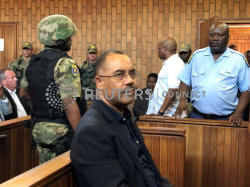South African court asks justice minister to rule on
extradition of Mozambique ex-finmin
 Send a link to a friend
Send a link to a friend
 [November 01, 2019] JOHANNESBURG
(Reuters) - A South African court on Friday revoked a previous decision
to extradite to Mozambique its former finance minister Manuel Chang,
wanted in relation to a $2 billion debt scandal there that plunged the
country's economy into crisis. [November 01, 2019] JOHANNESBURG
(Reuters) - A South African court on Friday revoked a previous decision
to extradite to Mozambique its former finance minister Manuel Chang,
wanted in relation to a $2 billion debt scandal there that plunged the
country's economy into crisis.
Both the United States and Mozambique are seeking the extradition of
Chang, whose has been in custody in South Africa since December when he
was arrested at the request of the United States for his alleged role in
borrowing that U.S. authorities say was fraudulent. He denies
wrongdoing.
Former South African justice minister Michael Masutha had decided before
leaving his post that Chang should be sent back to Mozambique.
But his successor, Ronald Lamola, applied to the court to have this
decision set aside.
On Friday, Judge Denise Fisher obliged, sending both Masutha's decision
to extradite Chang to Mozambique as well as his dismissal of the U.S.
extradition request to Lamola for him to rule on the matter.

"Both decisions are remitted to the current minister for determination,"
the written ruling said. The parties can appeal the decision.
A lawyer for Chang did not immediately respond to a message seeking
comment.
"We will study the judgment itself... consult with our client the
Republic of Mozambique and then we will make a decision on the way
forward," Sami Modiba, a lawyer for Mozambique, said following the
ruling.
Subject to any appeal, Lamola will now make the final call in a 10-month
battle for Chang's custody that has put the United States and Mozambique
at loggerheads, just as other powers such as Russia crank up efforts to
gain influence in the African country.
One factor in Lamola's move to have his predecessor's decision revoked
was a concern that Chang still benefited from political immunity in
Mozambique.
[to top of second column] |

Mozambique's former finance minister Manuel Chang appears in court
during an extradition hearing in Johannesburg, South Africa, January
8, 2019. REUTERS/Shafiek Tassiem/File Photo

In an affidavit in August, Mozambique's Attorney General said that before a
lawmaker's immunity can be formally lifted in the country, that person must
appear before a judge there, which Chang cannot do while he is in South Africa.
If sent to the United States, analysts say he may reveal more details of the
debt scandal, with potential implications for senior members of the ruling party
in Mozambique, where the political situation is fragile following a contested
election.
The U.S. charges relate to loans obtained from Credit Suisse <CSGN.S> and
Russia's VTB bank that were guaranteed by the Mozambican government but some of
which were not disclosed, that Chang signed off on during his 2005-2015 term as
finance minister.
Their disclosure in 2016 prompted foreign donors including the International
Monetary Fund to cut off support for Mozambique, triggering a currency collapse
and debt default.
Mozambique has not yet formally charged Chang with a crime, prompting civil
society organizations to argue that he should be sent to the United States.
A trial in Mozambique over the scandal, which has also ensnared three former
Credit Suisse bankers, is already underway.
(Reporting by Naledi Mashishi; Writing by Emma Rumney; Editing by Catherine
Evans and Hugh Lawson)
[© 2019 Thomson Reuters. All rights
reserved.] Copyright 2019 Reuters. All rights reserved. This material may not be published,
broadcast, rewritten or redistributed.
Thompson Reuters is solely responsible for this content.
 |